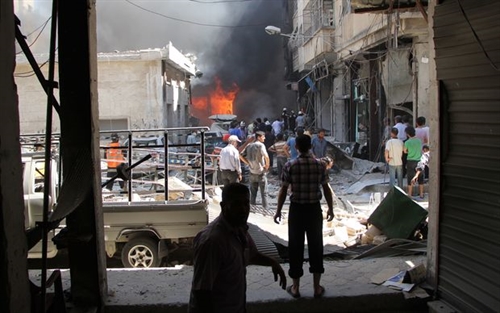 World
World

A barrage of airstrikes on rebel-held areas in Syria have killed scores of people, just hours after the government in Damascus approved a US-Russian plan to halt fighting in the country's suppurating civil war.
 |
| Syrian men search for victims at the scene of a reported air strike on the rebel-held northwestern city of Idlib. — AFP/VNA Photo |
BEIRUT — A barrage of airstrikes on rebel-held areas in Syria have killed scores of people, just hours after the government in Damascus approved a US-Russian plan to halt fighting in the country’s suppurating civil war.
It was not immediately clear who carried out the raids, which hit the key northern cities of Idlib and
But they came as a new ceasefire, agreed as part of a landmark deal brokered by
The regime of President Bashar al-Assad approved the truce deal on Saturday, but the main opposition group was more cautious.
Syrian state news agency
Citing "informed sources", it said "the entire agreement was reached with the knowledge of the Syrian government".
The opposition High Negotiations Committee (HNC) was more circumspect, saying it had yet to receive the deal’s "official" text.
Despite the apparent breakthrough, the killing continued, with deadly bombing raids on the rebel stronghold of Idlib province.
The Syrian Observatory for Human Rights said 58 people were killed in raids on various neighbourhoods of Idlib city, including a market, but it was not immediately clear who carried out the strikes.
The toll included 13 women and 13 children, it said.
An AFP photographer in Idlib saw men clambering over rubble in just sandals to help evacuate wounded and dust-covered residents from a collapsing building.
Another 12 civilians were killed in unidentified strikes on several neighbourhoods of
’Best chance’
The landmark deal, reached after marathon talks in
Both Kerry and Lavrov said the complex plan is the best chance to end the five-year war that has killed more than 290,000 people and seen millions flee to neighbouring countries.
Under the deal, fighting would halt across the country at sundown on Monday and
In turn,
But mainstream opposition fighters have not indicated a willingness to break their alliance with powerful hardliners, which they view as "a military necessity", according to
’Beginning of the end’
Leading HNC member Bassma Kodmani told AFP that her group "cautiously welcomed" the deal but was sceptical that
Kodmani said the opposition would "do our part" to see that rebel groups break ranks with the jihadists if the truce held.
UN Syria envoy Staffan de Mistura said that the deal provided a "window of opportunity" and that he would begin consultations on relaunching peace talks.
But the question of Assad’s fate remains a key sticking point: the HNC repeated its demand this week that he leave power, but
A UN-supported truce in February faltered after each side accused the other of repeated violations, and
"Nobody among the Syrian population accepts this agreement... (the opposition) are all the same and none of them will commit to this truce," he said.
But student Abdulhadi Al-Omari said he believed "it is the beginning of the end of the crisis".
"I am very optimistic because this truce is not like the previous one, it categorises the opposition groups between terrorist and moderate," he said.
In a letter, he said the initial truce would last 48 hours and could then be renewed, and that it would be "more effective than its predecessor" because it would halt Syrian strikes "on civilians and the opposition". — AFP




